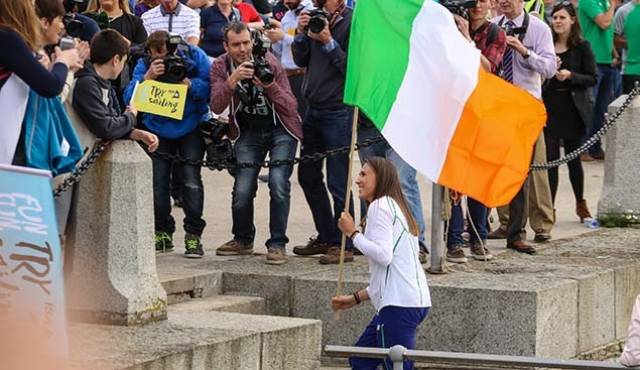While Irish Sailing is rightfully basking in the reflected glory of last night's homecoming celebrations for Annalise Murphy and its Olympic Sailing Team there will also be one eye to the future, considering how to turn the positive Rio results into tangible benefits for the development of sailing in Ireland, not just in High Performance, but across every aspect of the sport.
There is no doubt that, in the modern sports world, medals mean money. An analysis of Sports funding in many developed countries shows that successful sports benefit from good results at World Championships and major Games.
In Atlanta in 1996, Britain finished 26th in the medal table (Ireland was 16th – entirely due to Michelle Smith) with a total of 15 medals from six sports. The improvement over the five intervening Olympiads to the 67 medals from 22 sports in Rio, is due to a variety of things, but perhaps most of all to the increased investment in sport aided by the introduction of the National Lottery. Sports with a plan, that medalled in Atlanta, benefitted the most, while the ones that lagged behind were given a boost by the increased investment occasioned by being the host nation for the 2012 games.
Sailing in the UK received £25.5m in the Rio Olympic cycle, the fourth highest funded sport after Athletics, Swimming and Cycling. Sailing in Ireland received €2.545m in High Performance funding, third place after Boxing and Athletics (figures exclude paralympic sports). It might also be argued that Ireland did better in terms of the cost per medal – the Irish Sailing silver medal cost €2.545m, while Britain's 3 sailing medals cost £8.5m each.
David O'Brien reports in the Irish Times that as Sport Ireland looks to fund the Tokyo 2020 squad, there is no doubt that Sailing and Rowing will enter the negotiations with the considerable clout that medals bring, but there will be a more forensic analysis of what led to success and whether the sport has a pipeline that will lead to sustainability of results on the international stage.
The ISA will be able to point to the potential shown in Rio as well as an impressive track record by ISA academy members at Youth Sailing Worlds and World and European Championships. There have been many significant results, not least World Youth Sailing bronze in the 420 in January and as recently as July, World Youth Silver in the Laser Radial.
Also under scrutiny, particularly in light of recent developments, will be whether the sport has robust governance, ensuring fairness and transparency, as well as a willingness to engage with the Irish Institute of Sport, an arm of Sport Ireland that played a leading role in the success in Rio. Irish Sailing passes these test as well, putting it in a very strong position to negotiate vigorously, not only for High Performance, but also for investment into the grassroots of the sport.
Click for more on last night's spectacular Olympic homecoming celebration on Afloat.ie






























































